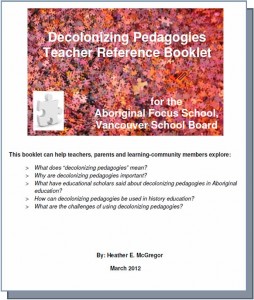The foundation for this organizational development plan is the Indigenous concept of All My Relations – the interrelatedness of all things, human and non-human. The historical and contemporary challenges and issues of how to become “a good relative” are outlined and the steps taken to build good relations between Indigenous and non-Indigenous peoples are acknowledged while focusing on Education. In the team building process for the main stakeholders of the Aboriginal Focus School, a series of workshops are proposed for the teachers, principal, administrative staff, School Board, parents and community members. These workshops will incorporate Indigenous epistemology and pedagogy, that is experiential learning of how to connect land, spirit and heart to mind learning outcomes.
Dorothy Christian

